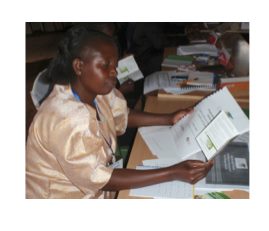GBM Blog
7 Billion and counting…
Editorial input from Agatha Mbulo, GBM Project Officer.
You are one of seven billion people who call Earth home. By 2100, 10 billion people are expected to inhabit the planet or, with just a slight variation in fertility rates, 15 billion people– that’s more than double the amount of people on the earth today.
 In Kenya, the population is expected to increase to 1500% of the 1950 population figures. Population growth has already put a strain on many people in Kenya. Currently 7 out of 10 rural farmers do not believe that their land is sufficient for their children to live and stay there. Despite this, the land is likely to be subdivided for the coming generations leading to small plots of over-exploited farmlands that may not be able to produce enough food. Other population effects on the environment like encroachment of forests, problems with water supply and sanitation, air pollution and overgrazing pose a challenge to providing a clean and healthy environment for all.
In Kenya, the population is expected to increase to 1500% of the 1950 population figures. Population growth has already put a strain on many people in Kenya. Currently 7 out of 10 rural farmers do not believe that their land is sufficient for their children to live and stay there. Despite this, the land is likely to be subdivided for the coming generations leading to small plots of over-exploited farmlands that may not be able to produce enough food. Other population effects on the environment like encroachment of forests, problems with water supply and sanitation, air pollution and overgrazing pose a challenge to providing a clean and healthy environment for all.
Apart from natural resources, larger populations put strains on health care, education and employment. Without proper family planning initiatives to curb this enormous growth, natural resources and many social services will have a hard time keeping up with demand. It is imperative that we start recognizing the challenges and begin mitigating against the risks of population growth.
The Green Belt Movement (GBM), FHI 360 and USAID have teamed up to tackle this dilemma. By promoting shared principles of the environment and health sectors, GBM and its partners are able to address challenges of population growth by promoting positive attitudes towards family planning.
Last week, through a training of trainer’s workshop, GBM staff, Kenya’s Ministry of Health and APHIAplus gained techniques, tools and knowledge to teach the linkages between population, health and environment (PHE) to Green Volunteers. These Green Volunteers, GBMs grassroots volunteers who work directly with local communities, will then lead PHE community education sessions and discussions on family planning and its benefits.
For GBM, this issue could not be more important. Not only due to our involvement in fighting for the environment and ensuring sustainable development, but because GBM’s projects are fundamentally carried out by the work of 4000 tree nursery groups (TNGs) around Kenya that are largely made up of rural women and men. By empowering these women and men, they will be better placed to make informed decisions about how to live healthy and sustainable lives, while continuing to promote the mission of the GBM.
We may have hit 7 billion people on Monday but we do not have to prove predictions for 2100 right. The change begins with each one of us. Be the head, take control, be responsible by JIHUSISHE, JIPANGE, AMUA - get involved, plan, act.
